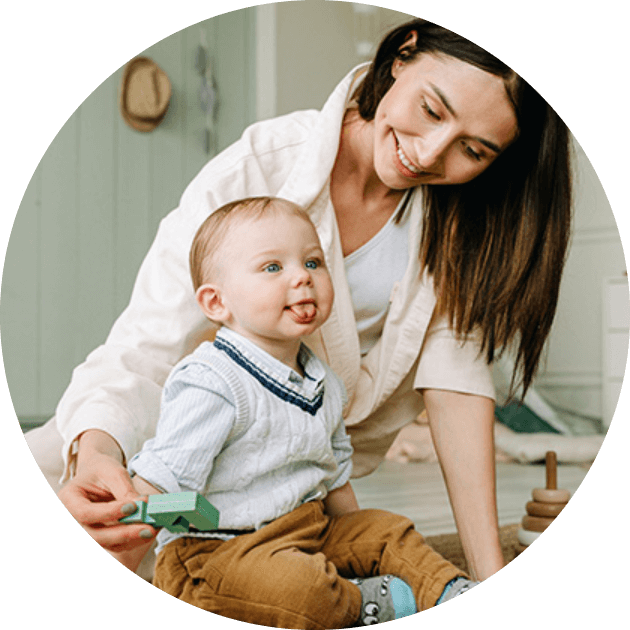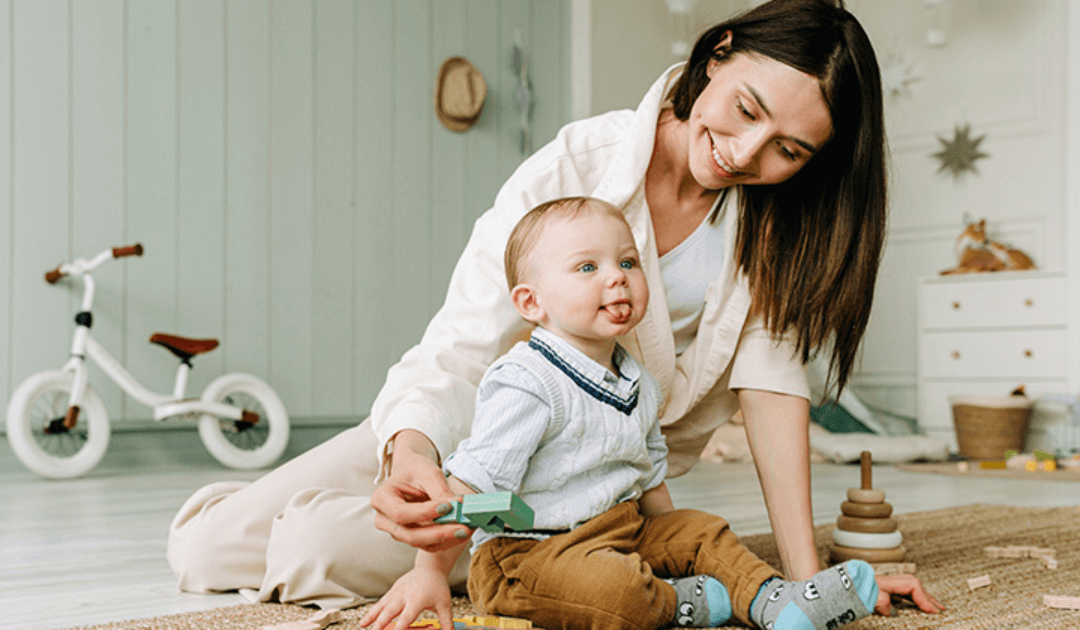
Children grow and develop at their own pace. This is a fact that a parent must be able to accept, just like the fact that their child may start walking or talking later. If your child does not reach certain developmental milestones, it is recommended to visit a specialist. Which milestones should you focus on?
There are children who, in terms of development, show almost a textbook example and reach each milestone on a daily basis. Then there are children who surpass their peers in everything, and there are those who develop at a slower pace , but still within the tolerance limit. When should you start worrying?
At the age of 0 - 4 months
Babies grow very quickly in the first months after birth, so parents can witness changes on a daily basis. A healthy newborn gains 140-200 grams in the first week and grows 1-2.5 cm per month. Children literally grow before our eyes and learn new skills at the same time. They must reach a certain level of development in the first four months of their lives . If you notice any of the following symptoms during this period, see your pediatrician as soon as possible, as they may indicate a developmental or other abnormality:
- squeals
- does not pay attention to loud noises
- he doesn’t look at his hands
- does not follow moving objects with his eyes
- does not grab objects
- he does not smile or laugh at the people around him
- he can’t keep his head
- not goofy and/or imitate sounds
- does not put objects in his mouth
- does not strain its paws when they touch a solid surface
At the age of 5 – 7 months
As the baby grows, its abilities and skills also develop. The five- to seven-month-old baby smiles, laughs, is excited . He grabs different objects, tastes them, snorts and makes noise. His world is expanding and he is discovering more and more of it every day. As with the previous one, there are defining milestones in this period , so be aware if you experience the following symptoms:
- his posture is stiff, his muscles tense
- his muscles are relaxed, with a rag doll posture
- he does not hold his head, his head leans back even in a sitting position
- he only reaches for the objects with one hand
- rejects babysitting
- it is not attached to the person taking care of it
- he is sensitive to light, his eyes water
- he finds it difficult to put his hand in his mouth
- it does not turn over in the fifth month
- he can’t even sit with help until the sixth month
- you don’t laugh or make a sound until the sixth month
At the age of 8 – 12 months
When they light the first candle on the birthday cake, they most likely already have a ready-made personality at home. The past months have brought physical, mental, social and emotional changes in the baby’s life, and in terms of development, further milestones lie ahead. Around 75% of children achieve these in a certain period. Watch for the following symptoms:
- does not climb or does not climb regularly, e.g. pulls one side
- unable to stand even with support
- does not search for objects hidden in plain sight
- he hasn’t said the first word yet
- does not gesticulate, e.g. he does not shake his head at the answer “no”.
- does not point to pictures or objects
Up to 2 years old
Intensive development also takes place during childhood. At the age of two, the majority of children are walking, talking, jumping, running … a little one is simply everywhere. During this very active period, many parents notice when something is wrong with their child. Why do not you speak? Why doesn’t he come? Why don’t you play the games? If you notice any of the following symptoms, do not hesitate and notify your child’s doctor:
- knows and uses less than 15 words
- does not use two-word sentences
- does not imitate words, sounds or movements
- unable to follow simple instructions (not to be confused with disobedience)
- cannot push wheeled toys
- It does not go until the age of 18 months
- even if you walk, you don’t use all parts of your foot (ie from toe to heel)
At the age of 3
The time flew by in a flash and it has now dwindled to three years. If your child has a developmental disorder , you’ve probably already discovered it, but there are still symptoms that cause concern:
- often falls and cannot climb stairs
- drools continuously and/or his speech is unintelligible
- cannot use more than 4 cubes when building a tower
- cannot manipulate small objects
- cannot draw a circle
- unable to communicate in short sentences
- he is not interested in group play, he does not participate in it
- does not understand simple instructions
- no longer interested in children
- does not maintain eye contact
- shows little interest in games
A parent knows their child best. He is the best able to assess his development and follow the progression of his behavior and skills. We always emphasize that comparison with peers is inappropriate because children develop at their own pace, but this does not mean that the child should not be monitored. If you feel that everything is not right, or if you have noticed one of the symptoms mentioned above , contact a specialist who will order the necessary tests.
Resources
- m B-R, SeoH-S, Ku J-M, et al. Silibinininhibits the production of pro-inflammatory cytokines through inhibition of NF-κB signaling pathway in HMC-1 human mast-cells. Inflammation. Research. 2013;62(11):941-950. doi:10.1007/s00011-013-0640-1.
- ChapowalA. PetasitesStudy Group. Randomisedcontrolled trial of butterbur and cetirizine for treating seasonal allergic rhinitis. BMJ 2002;324:144-6.
- Hayes, N. A. and Foreman, J. C. The activity of compounds extracted from feverfew on histamine release from rat mast-cells. J Pharm Pharmacol1987;39(6):466-470
- Hsieh et al. Baicalein inhibits IL-1ß- and TNF-a-induced inflammatory cytokine production from human mast-cells via regulation of the NF-?B pathway. ClinMolAllergy. 5: 5. 2007.
- TheoharidesTC, Patra P, Boucher W, et al. Chondroitin sulphateinhibits connective tissue mast-cells. British Journal of Pharmacology. 2000;131(6):1039-1049. doi:10.1038/ sj.bjp.0703672.
- Ro JY, Lee BC, Kim JY, et al. Inhibitory mechanism of aloe single component (alprogen) on mediator release in guinea pig lung mast-cells activated with specific antigenantibodyreactions. J PharmacolExpTher. 2000;292:114–121. 73.
- https://www.ncbi.nlm.nih.gov/pubmed/24477254
- https://www.ncbi.nlm.nih.gov/pubmed/28458279
- https://www.ncbi.nlm.nih.gov/pubmed/9421440
- https://www.ncbi.nlm.nih.gov/pubmed/10344773
- https://www.ncbi.nlm.nih.gov/pmc/articles/PMC4315779/


